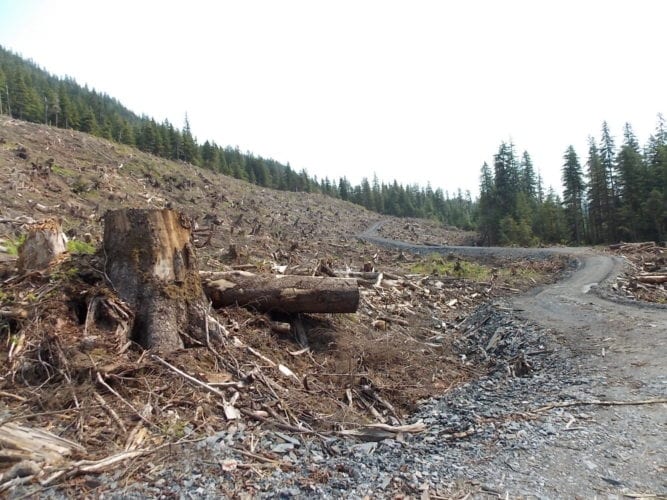Petersburg’s borough assembly will wait on voicing an opinion on federal legislation that could transfer up to two million acres of the Tongass National Forest to the state of Alaska. Assembly members agreed to table a vote on a resolution opposing the bill that has been introduced by Alaska Congressman Don Young.
The bill is called the State National Forest Management Act of 2017, introduced in January by the Alaska Republican. It would allow states to select up to two million acres of National Forest land for logging or other uses. States would have to pay for that land, exchange state land for it, or take it as part of an outstanding land entitlement.
Borough residents submitted letters and turned out to testify against the legislation.
“There’s a variety of reasons why I don’t believe that transferring this land into state control is the best use of the land, ” said Christina Sargent. “I think the Forest Service does a good job of allowing for multiple use and I’m concerned that the Southeast state forest plan is emphasis too heavily on the timber production of the forest and not enough on the multiple use.”
Other residents voiced concern with potential impacts to salmon streams if forests were cut under state forest practices, rather than stricter protection required under federal management.

National Forest land on the Lindenberg Penninsula of Kupreanof Island near Petersburg (KFSK file photo)
Malena Marvin thought it could impact her fishing business. “I grew up in Oregon while salmon were tanking and let me tell you it happens. It happened,” Marvin said. “And I think logging was the number one land management practice that we didn’t plan well enough for. And we grew up hearing the commercial Oregon will never run out of trees and we didn’t. But we did run out of salmon. And I don’t think we can afford to do that in Southeast in this day and age, especially not here in Petersburg and so I think that’s why as a community we really do need to weigh in with the federal voice and say we have a lot to lose here and not a whole lot to gain.”
The borough also received letters from tour companies that visit the area opposing Young’s bill. The assembly was considering a resolution that opposed the bill, saying it seeks to circumvent public involvement and environmental oversight. Vice mayor Cindi Lagoudakis drafted that resolution. On a radio call in show earlier in the day, Lagoudakis outlined some of her concerns about the bill, including the loss of Forest Service jobs. “I think we’re gonna see jobs move out of our community. And in small communities I don’t think that we can afford to lose a single job. And then my other concern is that losing National Forest land in proximity to our communities also affects Payment in Lieu of Taxes and Secure Rural Schools and that has been a big item of concern.” Those are payments from the federal government to municipalities like Petersburg near National Forest land.
On that same radio show mayor Mark Jensen spoke against the local statement of opposition and wanted the bill to move forward. “I would imagine the lands that would be selected would probably be lands that had infrastructure on them already as far as logging roads to make it easier to get to new timber sales. I think we need to have more resource extraction but it needs to be done responsibly.”
At the meeting Monday night, it didn’t appear the local resolution had enough votes to pass. Assembly member Eric Castro, who works for the U.S. Forest Service, wanted to recuse himself from the vote.
“From my perspective this resolution needs to be rewritten to do what we as a borough think we should have in the longer term, although I don’t support House bill 232,” said assembly member Bob Lynn.
Assembly members made a motion to table the resolution until a later date. Young’s bill has no other co-sponsors and has been referred to a sub-committee on Energy and Mineral Resources.









